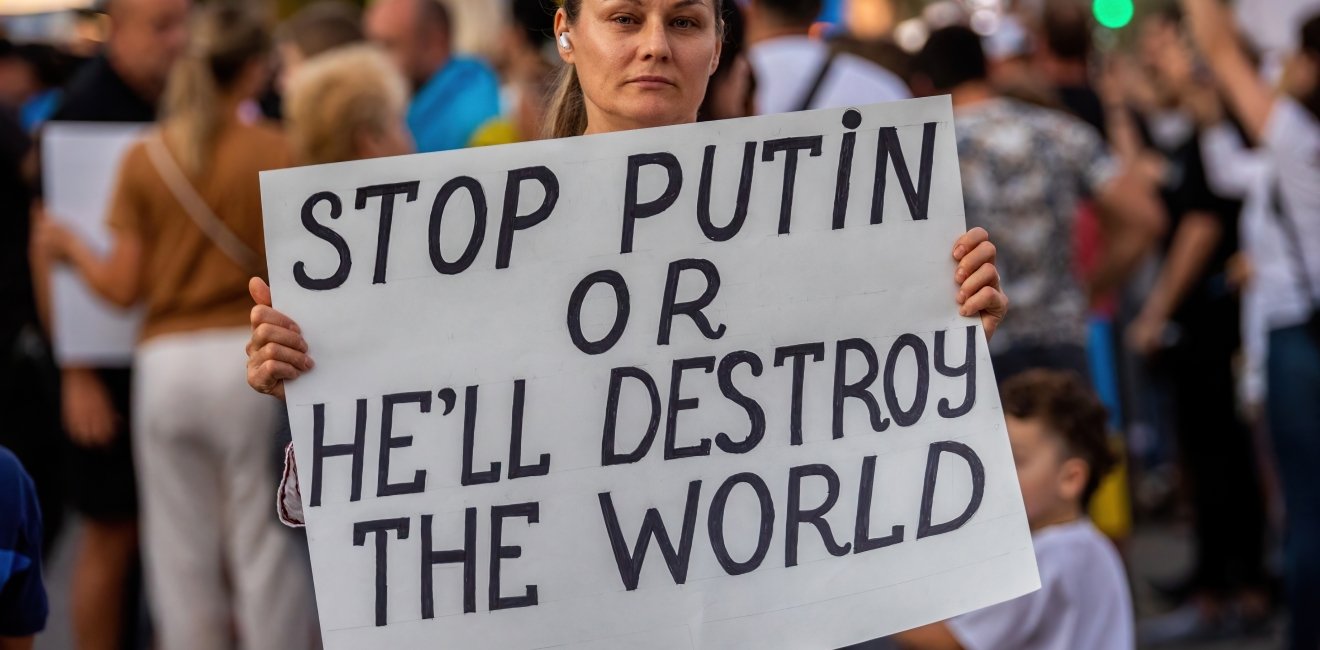
A blog of the Kennan Institute
BY OLENA LENNON
Since Russia’s launch of a large-scale invasion of Ukraine on February 24, it has been clear that Vladimir Putin’s announced “special operation” did not go according to plan. Putin’s proclaimed goals of “demilitarizing” and “denazifying” the government of Ukraine—combined with the Russian military posture and performance in the opening days of the invasion—led many experts to conclude that Putin’s original war aims were nothing short of regime change in Kyiv.
However, faced with fierce Ukrainian defense and the West’s crippling economic sanctions, Putin appears to be recalculating his initial maximalist aims. Putin’s efforts to force Zelensky to concede on all demands—lay down arms, forswear membership in Western alliances, and recognize Russia’s annexation of Crimea and the independence of the "republics" in the Donbas—would essentially amount to Ukraine’s surrender, and thus have proven futile.
Given the colossal failure of the Russian military to execute Putin’s political objectives, and faced with Ukraine’s resilience, supported by the West, Putin might be reducing his goals of “demilitarizing” Ukraine to destroying Ukraine’s economic, civilian, and defense infrastructure, sans political regime change—at least in the immediate future. Several signs of Putin's goal recalibration stand out.
First, after suffering tremendous equipment and human losses in the opening stages of the invasion, Russian forces are reportedly demoralized and exhausted, and face significant supply shortages. Not only has Putin underestimated Ukraine's military—which has been modernized, professionalized, and battle-hardened—but he has overestimated the Russian military’s capability to achieve his maximalist aims.
According to Michael Kofman, director of Russia Studies at CNA, Russia's military was “not built for this war,” and “in terms of manpower, readiness, and logistics, it was not designed to sustain strategic ground offensives or hold large tracts of terrain, especially in a country the size of Ukraine.” Nor were the Russians “ready for unconventional warfare” and urban fighting in Ukrainian cities, according to Rob Lee, a senior fellow at the Foreign Policy Research Institute.
In light of the Russian military’s many deficiencies and poor performance, the Kremlin may be seeking not only an operational pause but also an abandonment of some of its maximalist aims, whose achievement would require a long-term commitment of forces Moscow cannot afford.
Military losses have forced the Russians to change their tactics, most notably by making greater use of airpower, but there may have been changes in Putin’s strategic calculus as well. As Russian ground troop advances have reportedly slowed, the strikes on critical infrastructure and military targets have intensified (the most recent strikes hit Yavoriv combat training center near the border with Poland and an aircraft factory in Kyiv), as have indiscriminate attacks on civilians.
These brutal, punitive strikes reflect the Kremlin’s frustration with the slow progress of the invasion and a desire to inflict more pain, force civilians to flee, and demoralize Ukraine’s political leadership. Attempts at holding some Ukrainian cities (such as Kherson and Melitopol) have already found the Russian military consumed and exhausted by urban fighting and civilian resistance, making the prospects of advancement grimmer by the day.
In light of these constraints, Putin’s miscalculated intent of “demilitarizing” Ukraine seems to be focused less on removing what he calls Ukraine’s “neo-Nazi” government and more on destroying Ukraine’s military-industrial enterprises and critical infrastructure and hindering Ukraine’s ability to reconstruct, which assumes its survival as an independent state.
Next, massive economic sanctions unleashed on Russia that were projected to cripple the Russian economy and military power in the long term are already beginning to bite. Meanwhile, the West’s weapon deliveries to Ukraine have only increased in size and scope and will result in more losses for the Russian military. These losses, combined with economic pressures and rising domestic discontent, may not only force Putin to the negotiating table with Zelensky (a move Putin has so far resisted) but threaten the very survival of the Putin regime.
Adding to Putin’s miscalculations is China’s unenthusiastic support of Russia. China remains a dark horse in this race. While China has not publicly condemned the Russian invasion, neither has it publicly supported it. Despite Putin’s and Xi Jinping’s friendly relationship and China’s opposition to Western sanctions, it is unclear whether China can fill the gaps in Russia’s economic and defense needs enough to sustain Russia’s war chest. Besides, China's desire to avoid economic consequences, including secondary sanctions, may curb its appetite to help Russia.
Under these conditions, Putin may soon be seeking sanctions relief, especially if his regime's survival is at stake. The establishment of humanitarian corridors enforced by ceasefires and an at least partial withdrawal of Russian troops from Ukraine will be seen as first steps in that direction. Based on Putin’s multiple miscalculations and the mounting pressure of military losses, economic sanctions, and domestic discontent, he is likely to seek an operational pause and explore opportunities for a negotiated settlement tied to sanctions relief.
The focus on off-ramps as face-saving for either Putin or Zelensky might be misplaced. Putin will present any adjustments to his aims of Ukraine’s “demilitarization” as original aims, allowing him to claim a victory. But even then, the viability of Putin’s regime might already be irrecoverable, regardless of the outcome of the war.
Zelensky, on the other hand, has already achieved many face-saving victories, not least in repelling Russian attacks, uniting Ukraine, and rallying the world in her support. Feedback loops between Zelensky, Ukraine’s armed forces, and civilians have reinforced Ukrainian statehood, patriotism, and resilience. However, it is incumbent upon Zelensky at this point to prevent further deaths and destruction and, as Mykhailo Podolyak, a senior adviser to Zelensky, said, to “compartmentalize” the sticking points related to Russia’s control of Crimea and some areas of the Donbas.
Whatever the terms of a future negotiated settlement and Ukraine’s “demilitarization,” the West should continue its military and economic support of Ukraine. While negotiations are seen to buy time for Ukraine, and Russia may seem willing to scale down its ambitions, the fighting has been picking up, and waiting might create the dynamics and conditions for further miscalculations borne out of despair.
The opinions expressed in this article are those solely of the authors and do not reflect the views of the Kennan Institute.
Author

Adjunct Professor of Political Science and National Security, University of New Haven

Kennan Institute
After more than 50 years as a vital part of the Wilson Center legacy, the Kennan Institute has become an independent think tank. You can find the current website for the Kennan Institute at kennaninstitute.org. Please look for future announcements about partnership activities between the Wilson Center and the Kennan Institute at Wilson Center Press Room. The Wilson Center is proud of its historic connection to the Kennan Institute and looks forward to supporting its activities as an independent center of knowledge. The Kennan Institute is committed to improving American understanding of Russia, Ukraine, Central Asia, the South Caucasus, and the surrounding region through research and exchange. Read more

Explore More in Focus Ukraine
Browse Focus Ukraine
Talking to the Dead to Heal the Living

Ukrainian Issue in Polish Elections


